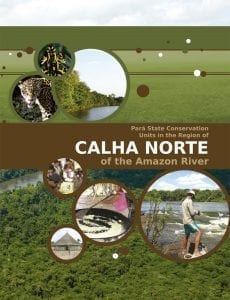 Check this for information about the largest corridor of biodiversity in the world.
Check this for information about the largest corridor of biodiversity in the world.
In December of 2006, the State Government of Pará created five Conservation Units (UCs) in the Calha Norte of the Amazon River, a high priority region for the conservation of biodiversity and with a large part of its territory still covered with primary forests. This initiative was part of a major plan of the Pará Government to promote the sustainable use and conservation of the forests in the State.
The UCs created were the State Forests (Flota) of Paru (3.6 million hectares), of Trombetas (3.2 million) and of Faro (0.63 million), the Ecological Station (Esec) of Grão-Pará (4.2 million, largest UC in tropical forests in the world) and the Biological Reserve (Rebio) of Maicuru (1.2 million), totaling 12.8 million of hectares. Furthermore, the region encompasses 7.2 million hectares of Indigenous Lands (TIs), 1.3 million hectares of federal UCs, 0.4 million hectares of Quilombola1 Lands (TQs), and another two state UCs, which together add to nearly 60 thousand hectares.
It is the largest set of Protected Areas in the planet in only one state, with nearly 22 million hectares – an area equivalent to the States of Paraná and Alagoas combined. In conjunction with the Amapá and Amazon Protected Areas, they form the largest corridor of biodiversity in the world. The Calha Norte is also embedded in the center of endemism of the Guyanas, a priority region in the actions and planning of conservation.
Recently, the Pará State Secretariat of the Environment (Sema-PA), in partnership with Imazon in the contribution and execution of a consortium of institutions2, elaborated, approved and published the Management Plans of the three Flotas of Calha Norte: Paru, Faro e Trombetas. Those plans predict that the management of the forest resources in the region will occur through forest concessions. In the same manner, the Management PlansoftheEsecGrão-Paráandof the Rebio Maicuru were approved and concluded, in partnership with Conservation International and contribution from Imazon. These actions enable the sustainable development of all the entire Calha Norte Region of the State of Pará. The objective of this booklet is to summarize the information about the State Conservation Units of Calha Norte. The target audiences are Quilombolas, extractivists and small producers, municipal governments, federal and state organs with activities in the Calha Norte and opinion makers.
Download the file here
